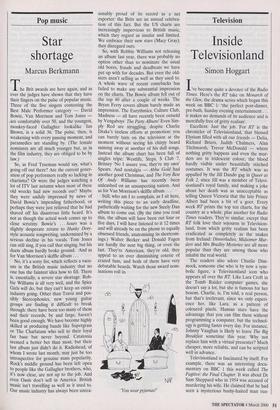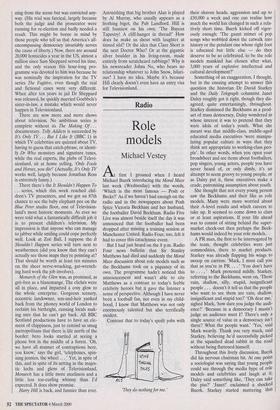Television
Inside Televisionland
Simon Hoggart
've become quite a devotee of the Radio Times. Here's the RT take on Monarch of the Glen, the drama series which began this week on BBC 1: 'the perfect post-dinner, pre-bath, Sunday evening entertainment ... it makes no demands of its audience and is mercifully free of gritty realism'.
Excellent. Just the job. For RT is the chronicler of Televisionland, that blessed Elysium filled with all our friends — Delia, Richard Briers, Judith Chalmers, Alan Titchmarsh, Trevor McDonald — where nothing gritty happens and even the mur- ders are in iridescent colour, the blood hardly visible under beautifully stitched costumes. It was the RT which was so appalled by the Jill Dando gag in Queer as Folk 2, since Jill was a member of Televi- sionland's royal family, and making a joke about her death was as unacceptable as telling Queen Victoria that the late Prince Albert had been a bit of a goer. Every week RT prints the top ten charts, for the country as a whole, plus another for Radio Times readers. They're similar, except that RT folk love their sojourns in Television- land, from which gritty realism has been eradicated as completely as the snakes from Ireland: Dinnerladies, Midsomer Mur- ders and Mrs Bradley Mysteries are all more popular than they are among those who inhabit the real world.
The readers also adore Charlie Dim- mock, someone else who is by now a sym- bolic figure, a Televisionland icon who appears all over the RT. Like Lara Croft in the Tomb Raider computer games, she doesn't say a lot, but she is famous for her bosom. Charlie, is, I'm told, a real person, but that's irrelevant, since we only experi- ence her, like Lara, as a pattern of coloured pixels. Human stars have the advantage that you can film them without programming a computer, but the technol- ogy is getting faster every clay. For instance, Johnny Vaughan is likely to leave The Big Breakfast sometime this year. Why not replace him with a virtual presenter? Much cheaper, more reliable, and can be scripted well in advance.
Televisionland is fascinated by itself. For example, there was an interesting docu- mentary on BBC 1 this week called The Fugitive: .the Final Chapter. It was about Dr Sam Sheppard who in 1954 was accused of murdering his wife. He claimed that he had seen a mysterious bushy-haired man run- ning from the scene but was convicted any- way. (His trial was farcical, largely because both the judge and the prosecutor were running for re-election and badly needed a result. This might be borne in mind by those people who tell us that America's all- encompassing democracy invariably serves the cause of liberty.) Now, there are around 20,000 homicides a year in the US, almost a million since Sam Sheppard served his time, and the only reason this hour-long pro- gramme was devoted to him was because he was nominally the inspiration for the TV series The Fugitive, even though the real and fictional cases were very different. When after ten years in jail Dr Sheppard was released, he quickly married Goebbels's sister-in-law, a mistake which would never happen in Televisionland.
There are now more and more shows about television. No ambitious series is complete without its The Making Of . . . documentary. Telly Addicts is succeeded by It's Only TV . . . But I Like It (BBC 1) in which TV celebrities are quizzed about TV, having to guess that catch-phrase, or identi- fy Dr Who monsters and signature tunes, while the real experts, the plebs of Televi- sionland, sit at home yelling, 'Only Fools and Horses, you div!' (Actually, It's Only TV works well, largely because Jonathan Ross is extremely funny.) There there's the It Shouldn't Happen To . . . series, which this week reached chil- dren's TV presenters, and we got an 87th chance to see the baby elephant pee on the Blue Peter studio floor, one of Television- land's most historic moments. As ever we were told what a fantastically difficult job it is to present children's television. My impression is that anyone who can manage to jabber while smiling could cope perfectly well. Look at Zoe Ball. I suppose the It Shouldn't Happen series will turn next to weathermen (did you know that they can't actually see those maps they're pointing at? That should be worth at least ten minutes on the sheer nerve-wracking, gut-wrench- ing hard work the job involves).
Monarch of the Glen was, as promised, as grit-free as a blancmange. The clichés were all in place, and imparted a cosy glow to the whole enterprise. Gorgeous scenery, eccentric landowner, son-and-heir yanked back from the phoney world of London to reclaim his birthright, cunning locals mak- ing sure that he can't get back. All BBC Scotland productions have to have an ele- ment of chippiness, just to remind us smug metropolitans that there is life north of the border: hero looks startled at seeing a phone box in the middle of a forest. 'Oh, we have all manner of contraptions here, you know,' says the girl, 'telephones, spin- ning jennies, the wheel ' Yet, in spite of this, and in spite of its setting in the majes- tic lochs and glens of Televisionland, Monarch has a little more steeliness and a little less toe-curling whimsy than I'd expected. It does show promise.
Harry Hill is back, and funnier than ever. Astonishing that big brother Alan is played by Al Murray, who usually appears as a frothing bigot, the Pub Landlord. Hill is still funniest on his own: 'The Bayeux Tapestry! A cliff-hanger in thread!' How does he make us shout with laughter at tinned sild? Or the idea that Clare Short is the next Doctor Who? Or at the gigantic silver boulder in his living-room, made entirely from scratchcard rubbings? Why is his newsreader Johns No, who bears no relationship whatever to John Snow, hilari- ous? I have no idea. Maybe it's because Hill clearly doesn't even have an entry visa for Televisionland.



































































 Previous page
Previous page